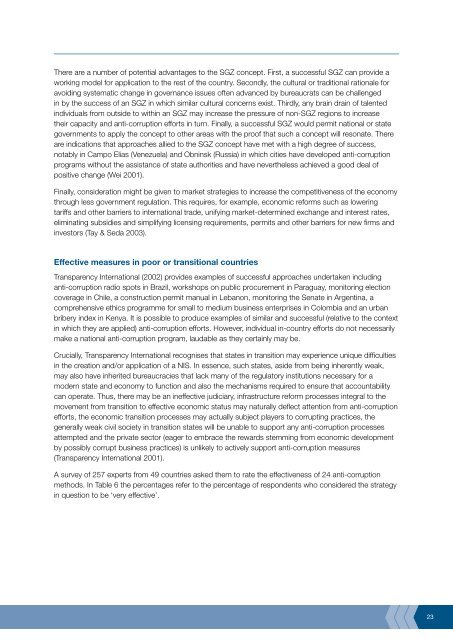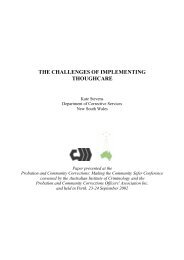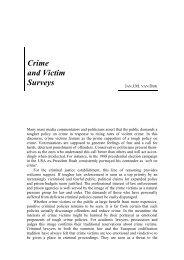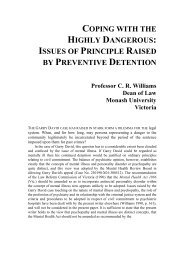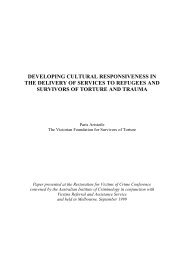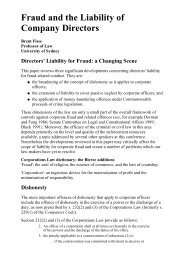Review of anti-corruption strategies Rob McCusker - Australian ...
Review of anti-corruption strategies Rob McCusker - Australian ...
Review of anti-corruption strategies Rob McCusker - Australian ...
Create successful ePaper yourself
Turn your PDF publications into a flip-book with our unique Google optimized e-Paper software.
There are a number <strong>of</strong> potential advantages to the SGZ concept. First, a successful SGZ can provide a<br />
working model for application to the rest <strong>of</strong> the country. Secondly, the cultural or traditional rationale for<br />
avoiding systematic change in governance issues <strong>of</strong>ten advanced by bureaucrats can be challenged<br />
in by the success <strong>of</strong> an SGZ in which similar cultural concerns exist. Thirdly, any brain drain <strong>of</strong> talented<br />
individuals from outside to within an SGZ may increase the pressure <strong>of</strong> non-SGZ regions to increase<br />
their capacity and <strong>anti</strong>-<strong>corruption</strong> efforts in turn. Finally, a successful SGZ would permit national or state<br />
governments to apply the concept to other areas with the pro<strong>of</strong> that such a concept will resonate. There<br />
are indications that approaches allied to the SGZ concept have met with a high degree <strong>of</strong> success,<br />
notably in Campo Elias (Venezuela) and Obninsk (Russia) in which cities have developed <strong>anti</strong>-<strong>corruption</strong><br />
programs without the assistance <strong>of</strong> state authorities and have nevertheless achieved a good deal <strong>of</strong><br />
positive change (Wei 2001).<br />
Finally, consideration might be given to market <strong>strategies</strong> to increase the competitiveness <strong>of</strong> the economy<br />
through less government regulation. This requires, for example, economic reforms such as lowering<br />
tariffs and other barriers to international trade, unifying market-determined exchange and interest rates,<br />
eliminating subsidies and simplifying licensing requirements, permits and other barriers for new firms and<br />
investors (Tay & Seda 2003).<br />
Effective measures in poor or transitional countries<br />
Transparency International (2002) provides examples <strong>of</strong> successful approaches undertaken including<br />
<strong>anti</strong>-<strong>corruption</strong> radio spots in Brazil, workshops on public procurement in Paraguay, monitoring election<br />
coverage in Chile, a construction permit manual in Lebanon, monitoring the Senate in Argentina, a<br />
comprehensive ethics programme for small to medium business enterprises in Colombia and an urban<br />
bribery index in Kenya. It is possible to produce examples <strong>of</strong> similar and successful (relative to the context<br />
in which they are applied) <strong>anti</strong>-<strong>corruption</strong> efforts. However, individual in-country efforts do not necessarily<br />
make a national <strong>anti</strong>-<strong>corruption</strong> program, laudable as they certainly may be.<br />
Crucially, Transparency International recognises that states in transition may experience unique difficulties<br />
in the creation and/or application <strong>of</strong> a NIS. In essence, such states, aside from being inherently weak,<br />
may also have inherited bureaucracies that lack many <strong>of</strong> the regulatory institutions necessary for a<br />
modern state and economy to function and also the mechanisms required to ensure that accountability<br />
can operate. Thus, there may be an ineffective judiciary, infrastructure reform processes integral to the<br />
movement from transition to effective economic status may naturally deflect attention from <strong>anti</strong>-<strong>corruption</strong><br />
efforts, the economic transition processes may actually subject players to corrupting practices, the<br />
generally weak civil society in transition states will be unable to support any <strong>anti</strong>-<strong>corruption</strong> processes<br />
attempted and the private sector (eager to embrace the rewards stemming from economic development<br />
by possibly corrupt business practices) is unlikely to actively support <strong>anti</strong>-<strong>corruption</strong> measures<br />
(Transparency International 2001).<br />
A survey <strong>of</strong> 257 experts from 49 countries asked them to rate the effectiveness <strong>of</strong> 24 <strong>anti</strong>-<strong>corruption</strong><br />
methods. In Table 6 the percentages refer to the percentage <strong>of</strong> respondents who considered the strategy<br />
in question to be ‘very effective’.


